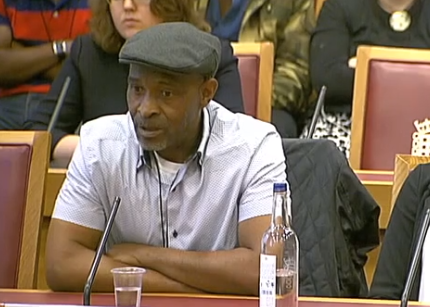Windrush man says he wouldn't have been wrongly detained if it weren't for his race
‘I hate to say it, but I don’t think I’d have this problem if I had come from Canada instead of coming from Jamaica,’ says Anthony Bryan

Your support helps us to tell the story
From reproductive rights to climate change to Big Tech, The Independent is on the ground when the story is developing. Whether it's investigating the financials of Elon Musk's pro-Trump PAC or producing our latest documentary, 'The A Word', which shines a light on the American women fighting for reproductive rights, we know how important it is to parse out the facts from the messaging.
At such a critical moment in US history, we need reporters on the ground. Your donation allows us to keep sending journalists to speak to both sides of the story.
The Independent is trusted by Americans across the entire political spectrum. And unlike many other quality news outlets, we choose not to lock Americans out of our reporting and analysis with paywalls. We believe quality journalism should be available to everyone, paid for by those who can afford it.
Your support makes all the difference.A member of the Windrush generation who was wrongly detained and threatened with deportation said he does not believe it would have happened had he been a different race.
Anthony Bryan, who has lived in the UK since he was eight years old, told MPs that had he come from Canada and not Jamaica, he thinks that he would not have faced such problems.
Speaking before the Human Rights Committee, he added that he thought racial discrimination was a problem in the Home Office.
“I hate to say it, but I don’t think I’d have this problem if I had come from Canada instead of coming from Jamaica,” the grandfather from north London said, as he described his experience of being classified as an illegal citizen, despite having lived in the country for decades.
Sitting next to him was his wife Janet, who added that it was “because of the colour of your skin”.
Baroness (Doreen) Lawrence of Clarendon, whose son Stephen Lawrence was murdered in a racially motivated attack in 1993, asked whether he believed race played a big part.
“In the Home Office, yeah,” he said.
Mr Bryan was held in a detention centre twice, for almost three weeks, last year.
“I didn’t believe they could do anything because I had been here so long. I was in primary school here,” he told MPs. “I didn’t believe it until they came banging on the door to take me into detention.”
Paulette Wilson, who was also detained for a week in a centre and narrowly avoided deportation despite having lived in Britain for 50 years, also gave evidence.
“I had the feeling I was going to be put on the plane the next day,” she said, adding: ”I would be in Jamaica all alone. I didn’t know anyone over there. I thought they were sending me to die.”
The pair were both members of the Windrush generation – people who arrived from the Caribbean between the late 1940s and early 1970s.
The name is a reference to the ship MV Empire Windrush, which arrived at Tilbury Docks, Essex, in June 1948, bringing workers from Jamaica, Trinidad and Tobago and other islands, as a response to post-war labour shortages in the UK.
Although they have every right to be in the country, some have been targeted by immigration officials.
As a result some have lost jobs and homes for failing to have the right paperwork, while others have reportedly been denied critical medical treatment and been targeted for deportation.
Their testimony came after home secretary Sajid Javid revealed earlier this week that the Home Office was investigating 63 cases involving people of Caribbean descent, who may have been removed from the country despite living in the UK legally for decades.
He told MPs: “The department has been going back and checking its records from 2002 onwards looking at all removals and deportations of Caribbean nationals aged over 45, meaning they could have potentially benefited from the 1971 Act. So far, we have found 63 cases where individuals could have entered the UK before 1973.”
Of the 63 cases, Mr Javid said 32 were foreign national offenders and 31 were administrative removals – of which he said all but one were voluntary removals, meaning they left because they received letters saying they must leave.
Join our commenting forum
Join thought-provoking conversations, follow other Independent readers and see their replies
Comments